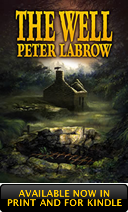Although quite a few scenes within Stephen King’s Finders Keepers are horrific, it wouldn’t really be true to call this horror. It’s closer to detective noir, and none the worse for it too.
For the most part, King abandons the supernatural for the natural – man’s worst instincts and drives brought to the fore in a story where the pace is increasingly relentless. That said, we get a glimpse of what some might call ‘classic King’ as one returning character… (no wait, that would be a spoiler).
For some people, things are worth more than people. This is certainly true of Finders Keepers’ antagonist, Morris Bellamy, whose obsession with one great American writer is the undoing of his life – and of many of those around him.
As in the The Treasure of the Sierra Madre, buried treasure eats away at those who seek it. The buried treasure in this case being some cash, but not a fortune, and some manuscripts – worth a fortune, and perhaps worth more to those who love that writer’s work.
The book is the second part of a projected trilogy, featuring the retired detective Kermit William Hodges (Bill, to his friends). Joining Bill are some of the characters from the previous book, Mr Mercedes. Bill now runs Finders Keepers, where he tries to keep alive the only skills he knows – policing, with a little bit of an edge.
Hodges’ path crosses that of Bellamy when a young girl, concerned about the rapid decline of her brother’s health, is brought to his office by a friend. That the boy’s father was almost killed by Brady Hartsfield, the titular Mr Mercedes from part one of the trilogy, is enough to pique Hodges’ interest – that, and loyalty to his friends.
King’s writing flows. As you’d expect, it’s a well-painted realisation of a situation that, in others’ hands, could come across as illogical or even slapstick – there are certainly plenty of scenes where one character just misses another going in the opposite direction. Here this just serves to heighten the tension, rather than engender disbelief.
Flaws? Of course. King’s portrait of Holly’s Asperger’s traits sometimes come across as affectations rather than a core part of her being – like ‘add ons’ rather than ‘built ins’. A couple of (quite nice) phrases are repeated and it feels like accident rather than purpose. But overall, this is a great book – for me, later King eclipses his earlier work in many ways.
The book’s great strength is its pace. It’s the equivalent of a giant spool, with the cord being unwound – slowly at first, then steadily ever faster. By the time you reach the final quarter of the book, you’re turning the pages ever faster, with an increasing reluctance to put it down. You can’t ask more from a book than that.

